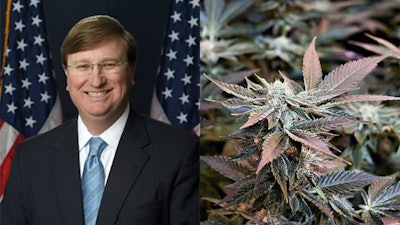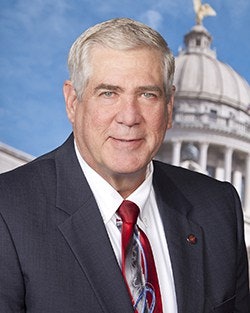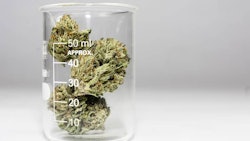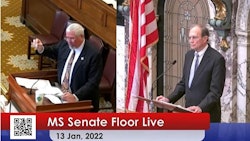
Mississippi’s medical cannabis legislation was going to become law with or without Republican Gov. Tate Reeves’ signature, but the executive decided to ink his name to a bill that he fought most of the way.
Reeves had until Feb. 2 to sign, veto or do nothing and let the Mississippi Medical Cannabis Act become law without his signature. Although, a gubernatorial veto would have only delayed the inevitable—the state Senate and House passed the legislation with roughly 90% of lawmakers in support between the two bodies.
Rather than risk another one of his vetoes from being overridden by the Republican-controlled Legislature, Reeves put pen to paper on Wednesday—456 days after Mississippi voters approved a medical cannabis legalization initiative in the 2020 election (which later was overturned by the state’s Supreme Court).
Mississippi is now the 37th state to legalize a medical cannabis program without strict restrictions. Flower will be capped at 30% THC while concentrated products will be capped at 60% THC under the new law.
Jax James, the state policies manager for advocacy group NORML, called the new law a significant step forward for Mississippi’s patient community.
“Marijuana access is long overdue for Mississippi’s patients,” James said in a news release. “The overwhelming majority of voters decided in favor of this policy change over a year ago, and for the past 14 months the will of the people has been denied.”
Despite signing the bill, Reeves still protested it in an official statement his office released on social media, putting the words “medical marijuana bill” in quotes and going on to say, “I have made it clear that the bill on my desk is not the one that I would have written.”
While legislative leaders spent more than six months crafting and revising the bill, Reeves questioned whether those leaders were proposing an adult-use program rather than a medical program because he deemed the allowable limits too high.
Under the legislation, qualifying patients will be able to access up to 3 ounces of dried cannabis flower per month, with a daily unit limit of 3.5 grams of flower, 1 gram of concentrate or 100 milligrams of THC in an infused product. The daily units are capped at six per week and 24 per month.
In his signing statement, Reeves said, “There is no doubt that there are individuals in our state who could do significantly better if they had access to medically prescribed doses of cannabis. There are also those who really want a recreational marijuana program that could lead to more people smoking and less people working, with all of the societal and family ills that that brings.”
While Reeves had encouraged Mississippians to vote “no” on Initiative 65, the voter-approved ballot measure from 2020, he said Wednesday in his signing statement that he’s committed to supporting the will of the people.
However, later in his statement, Reeves lauded the fact that his office fought to reduce the total amount of medical cannabis that any one patient can receive (3 ounces per month), when the voters of Mississippi approved a ballot measure that called for 5 ounces.
Reeves said the legislation evolved through 45 or 46 drafts before it arrived on his desk, and he listed six other “improvements we fought to include in the final version” of the bill:
- A medical professional can only prescribe within the scope of his/her practice and must have a relationship with the patient, requiring an in-person visit by the patient.
- Only a doctor of medicine (M.D.) or a doctor of osteopathic medicine (D.O.) can prescribe for patients 25 or younger.
- Patients under 18 must have the consent of a parent or legal guardian.
- The Mississippi State Department of Health (MSDH) will promulgate rules regarding packaging and advertising.
- Incentives for the industry from the Mississippi Development Authority are prohibited.
- Cannabis dispensaries cannot be located within 1,000 feet of churches and schools.
After the Mississippi Supreme Court overturned Initiative 65 last May, Reeves said he was willing to call a special session to pass a medical cannabis bill if legislative leaders from both chambers of the Legislature came to an agreement, but the governor never did.

Sen. Kevin Blackwell, a Republican from DeSoto County who sponsored the bill, told Cannabis Business Times last month that every time he presented a new draft to Reeves in hopes of a special session in 2021, the governor kept coming back with more and more requests.
“We accommodated seven of them,” Blackwell said of the governor’s first nine requests. “Then he came back with about five or seven more. We accommodated [all but two]. And then he came back with some more.”
Under the new law, MSDH officials will have 60 days from enactment to begin issuing registry ID cards to qualifying patients, and 150 days to begin licensing dispensaries, according to policy reform organization Marijuana Policy Project (MPP).
In addition, the legislation does not limit the number of licensed dispensaries, and cannabis sales will be subject to the state’s 7% sales tax and a 5% excise tax.
While the new law includes more than 20 qualifying conditions, it would “force pain patients to try opiates and other risky treatments before cannabis,” according to MPP.
NORML’s James echoed that concern as well as others.
“We remain concerned that lawmakers saw fit to add unnecessary taxes on cannabis products, that patients are prohibited from home-cultivating limited amounts of cannabis for their own personal use, and that those with chronic pain are restricted from accessing cannabis products until first using more dangerous and addictive substances like opioids,” she said.
After his signing, Reeves said he’ll be eager to put the legislation in his rearview.
“Now, hopefully, we can put this issue behind us and move on to other pressing matters facing our state,” he said.
























